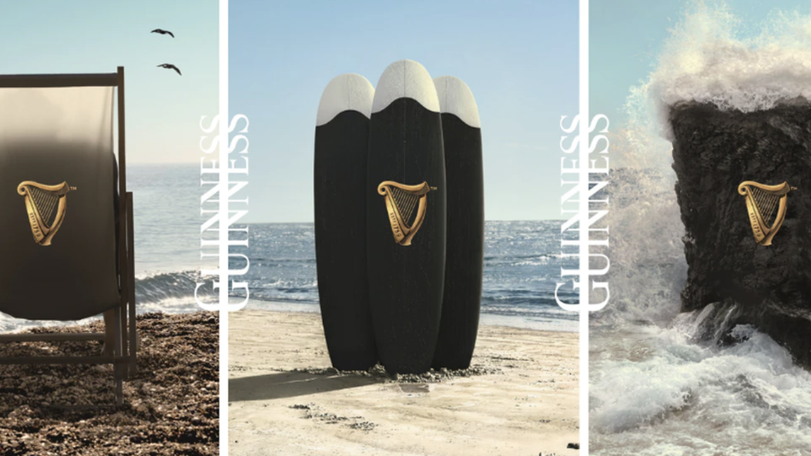
IPA Effectiveness Winners
Five Things We Learned… About The Growth of Guinness
Alongside AMV BBDO, the brand won The President’s Prize for Next Generation Brand Building at The IPA Effectiveness Awards
09 October 2024
Like the rest of the world, when Covid-19 hit, the beer industry went into crisis mode as the hospitality sector shut down. But despite the many challenges it faced, Guinness successfully navigated through the disruption while building its brand creatively and commercially.
Marketing has been a core ingredient to Guinness over its rich history, and it was potentially never more important than over the last four years when it has grown to become the best-selling pint for the first time in its history.
Its partnership with long-standing advertising agency AMV BBDO cannot be underestimated during that period, where it underlined the distinctiveness of the brand and its role in social occasions to help Guinness enter a new era.
In 2020, even before Covid-19, the leading beer brands were seeing a decline in sales while the booming popularity of craft beer was also on the wane. The enforced closure of licensed premises across the UK and Ireland due to the restrictions imposed during the pandemic especially impacted Guinness as a drink for social occasions. This resulted in the brand choosing to support pubs financially in their own time of need.
It also gave the marketing team a chance to take stock and consider its communications for when the time came for a return to normality.
This strategy consisted of four principles: opening up the brand to appeal to more adults and occasions; balancing reach and relevance throughout the year; creating culture as both input and output; and placing even more of an emphasis on its distinctiveness.
This would see it lose the ‘Made of More’ brand platform to become more inviting and communal, with all marketing in the two territories created to meet the strategic plan. It led to the release of six campaigns led by ‘Welcome Back’ - an ad that ran when people returned to social situations, featuring items that perhaps reminded them of a pint of Guinness.
This spot was followed up by a summer campaign along the same theme ‘#lookslikeguinness’, and then ‘Lovely Day for a Guinness’ which focused on a group of friends trying to enjoy the sunshine and a pint together.
The release of a zero alcohol variant Guinness 0.0 with a supporting ad campaign also took place in 2023, recognising the growing trend of people in social occasions who want to drink a Guinness without getting drunk.
Alison Falconer, global planning director for Diageo, described Guinness as “a brand with extraordinary gifts”.
“There's music and magic in that black liquid and the way its drinkers feel about it. It's a brand that many creative people want to work on, and that's a privilege we don't take for granted. So, when it comes to change, to asking those creative minds to think differently about what type of work this brand needs, it can feel risky,” she says.
“It had to [evolve] in order to meet its full potential,” Falconer continues. “We needed to make the extraordinary more magnetic, to more people, more often. So we learnt to shake up some of our own orthodoxies, to meet our target drinkers in their world rather than shout at them from ours, and to strive for work that is as effective in the contemporary marketing model as TV advertising was in its heyday. We hope many more great creative minds want to work on Guinness in the future. This story of generating success through extremely challenging times, proves that it can be deeply rewarding.”
The brand was one of this year’s main winners at The IPA Effectiveness Awards, with Guinness and AMV BBDO wining The President’s Prize for Next Generation Brand Building.
Here are five things we learned from reading the entry paper:
Despite being a tough few years for beer brands, Guinness has witnessed a period of innovation and commercial growth, delivering strong ROI from its marketing and reaching its highest penetration in Great Britain of 7.5 per cent, and 20.1 per cent in Ireland (it previously scored a high of 20.4 per cent in 2019). It did however grow its total share in Ireland from a higher base by 18 per cent to a record 30.5 per cent.
By summer 2021, Guinness was the most searched-for beer in the UK with the gap to the nearest competitor (Brewdog) widening further by the end of 2023.
Due to the strength of the brand, Guinness increased its prices by between 10 per cent and 16 per cent while continuing to grow.
During the St Patrick’s Day campaign to promote Guinness 0.0 in 2023, it was able to increase sales of the non-alcohol variant by 50 per cent, with 150 more pubs selling it permanently, whist also changing attitudes to its c onsumption. The accompanying ‘Singing Pints’ spot was the brand’s best ever promoting ad, according to Kantar too.
Guinness claims to be the most culturally powerful beer brand in the world with eight times as many social mentions per 1,000 pints sold compared to Budweiser and Heineken in 2022, according to Sprinklr data. Its 'Foot Pints' campaign from December 2023 received over 5.2 million views on Instagram resulting in over 17.5 thousand registrations from 60 countries to its website.




